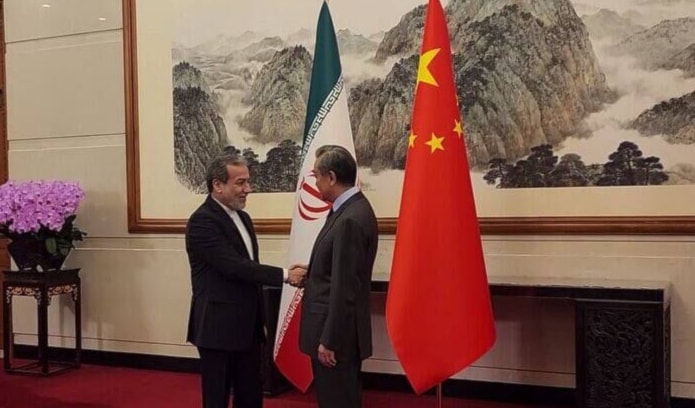No to foreign intervention in Middle East: China-Iran meeting
The Iranian and Chinese foreign ministers stress the need to strengthen bilateral ties while discussing Middle East developments during a meeting.
-

Iranian foreign minister Abbas Araghchi shakes the hand of his Chinese counterpart, Wang Yi, ahead of their meeting in Beijing, China, December 28, 2024 (IRNA)
Chinese Foreign Minister Wang Yi called on key stakeholders to play constructive roles in maintaining regional stability and security in the Middle East during his meeting with his Iranian counterpart, Abbas Araghchi, in Beijing on Saturday.
Wang emphasized the need for an immediate ceasefire and alleviation of suffering through finding political solutions and continued dialogue to "ensure order and eliminate chaos."
According to the foreign minister, China "urges the international community to respect the region's historical and cultural traditions, as well as the decisions made by its people," warning against attempts to impose external wills or interference using sanctions, pressure, or force.
Wang reiterated that the people of the Middle East are the primary decision-makers for the region, affirming Beijing's continued support for their efforts in development, conflict resolution through dialogue and consultation, and guaranteeing sovereignty, independence, and territorial integrity, as well as in resisting foreign interventions.
Regarding Iran, the Chinese foreign minister said that his country "seeks to resolve disagreements through diplomatic and political channels and to preserve the Iranian nuclear agreement."
He added that Beijing encourages all parties to play constructive roles in advancing dialogue and negotiations, expressing China's opposition to sanctions and pressure on Iran while affirming its support for Iran's legitimate rights and interests.
For his part, Araghchi praised China's support and contributions to advancing the Iranian nuclear agreement, stressing Tehran's interest in maintaining close relations with Beijing.
The meeting between both countries essentially focused on strengthening and developing strategic bilateral relations, as well as the latest developments in economic, trade, investment, energy, and transportation and ways to enhance them, according to the Iranian news agency IRNA.
The Iranian Ministry of Foreign Affairs described the talks held by Minister Araghchi in Beijing as fruitful and comprehensive, adding that the two countries are determined to expand their bilateral relations as strategic partners in a way that serves their mutual interests.
A visit to kickstart the "golden age"
This comes after Araghchi said that new conditions surrounding the nuclear dilemma and sanctions-lifting discussions in 2025 require "more consultations" with China. Araghchi made the statements while meeting with the media upon his arrival in Beijing on Friday, at the request of his Chinese counterpart Wang Yi.
"The main goal of this visit is to [facilitate] consultations on bilateral, regional, and international issues," he told reporters.
He noted that Iran has maintained close talks with China on all regional and international problems, stressing that the two nations have traditionally had strong relations and should continue to collaborate on various subjects.
"We are currently facing a sensitive situation," the senior Iranian official said, citing several regional and global developments.
Araghchi stated that Tehran and Beijing must participate in more talks to prepare for regional and international problems in 2025, particularly those involving the United Nations Security Council.
In an article published by China's official People's Daily newspaper on Friday, the Iranian foreign minister stated that his travel to China will mark a "new chapter" in strategic collaboration between the two nations and usher in a "golden" age for bilateral ties.
Iran's Foreign Minister Abbas Araghchi and his delegation have arrived in Beijing to discuss views on bilateral relations and regional and international developments. pic.twitter.com/vG8YctHHZa
— Press TV 🔻 (@PressTV) December 27, 2024

 3 Min Read
3 Min Read








